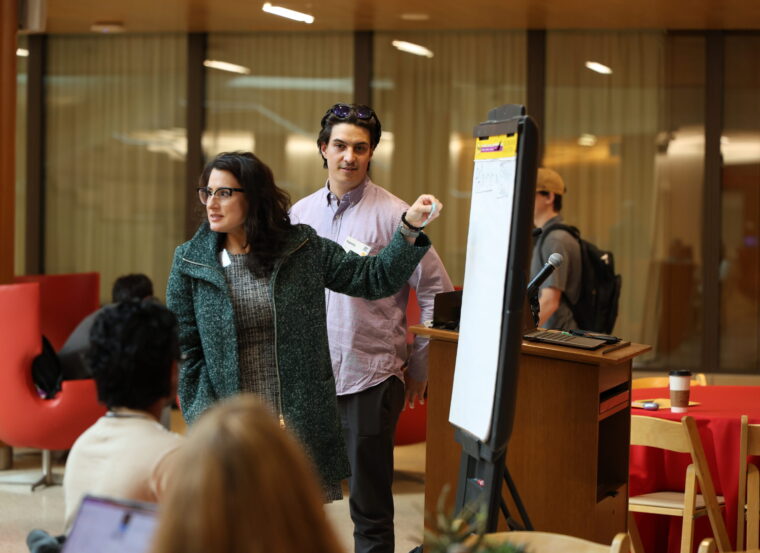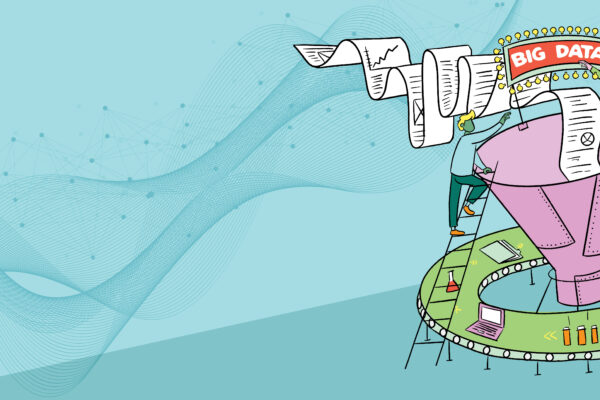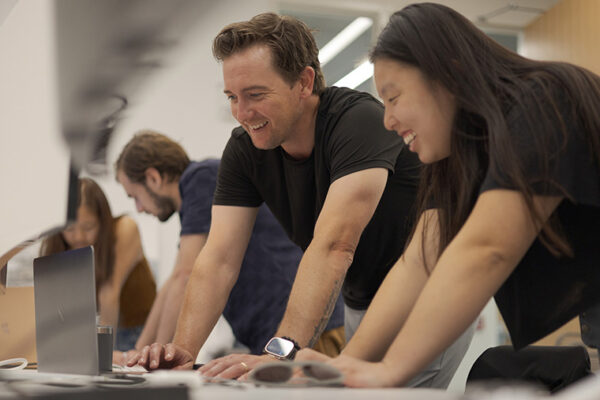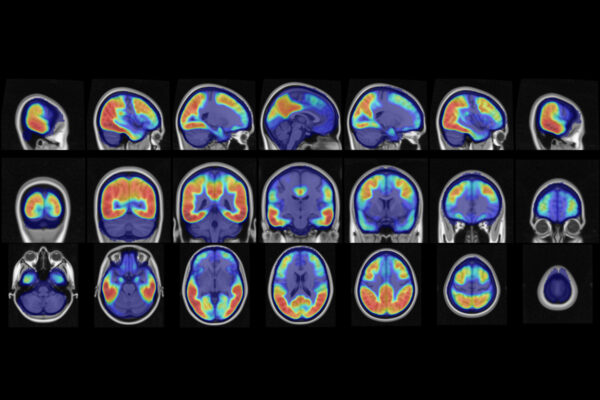Creating a data-driven solutions studio that brings research projects to life faster than ever. Connecting field-leading experts in the digital domain. Forging new relationships and laying out the vision for Washington University in St. Louis’ position in the ever-expanding artificial intelligence (AI) space.
These are all early successes spun out from WashU’s Digital Intelligence & Innovation (DI2) Accelerator, the institutional home of the university’s Digital Transformation initiative. Digital transformation is a key component of “Here and Next,” the university’s 10-year strategic plan that aims to generate transformative solutions to the world’s deepest societal challenges.
“The DI2 Accelerator’s impact in early phases is remarkable,” said Beverly Wendland, provost and executive vice chancellor for academic affairs. “The digital world holds unlimited promise, and the accelerator is helping bring its power directly to our WashU community. This is just the start of its vital work, and I’m excited to watch its progress.”
The DI2 Accelerator has several mechanisms to support and speed up projects across the university. Seed grants and preproposal assistance are available for interdisciplinary research. The accelerator also serves as a connector for faculty across both WashU campuses to foster creativity and collaboration.
“We aim to reach every corner of our university, helping to make our collective work more efficient and connected,” said Philip R.O. Payne, the Janet and Bernard Becker Professor at the School of Medicine, founding director of the Institute for Informatics, Data Science and Biostatistics, and leader of the Digital Transformation initiative. “We are committed to being leaders in digital technology and innovation while focusing on our interdisciplinary research strengths.”
The accelerator will soon roll out several significant new systems and updates:
A universitywide faculty research profiling system
Under Wendland’s leadership, WashU Libraries and the DI2 Accelerator will explore development of a universitywide faculty research profiling system to create a robust catalog of people, topics and connections both within and beyond the institution. A profile platform will allow faculty, staff and students across departments and disciplines to seek out peers or mentors with a specific research focus, fostering collaboration to address complex global challenges. The new system also will make it easier to match funding opportunities to relevant researchers and to track faculty publications.
Formation of the Joint Office for Digital Transformation
Payne and Jessie Minton, vice chancellor for technology and chief information officer, are planning a new Joint Office for Digital Transformation, which will further unite the DI² Accelerator and WashU Information Technology. While still in the planning stages, the goal is that this office could streamline the secure, rapid deployment of advanced digital tools on an institutional level, delivering the technology platforms needed for a “digital first” approach to research and innovation. This new collaboration will support data-driven and computationally intensive solutions that are both reliable and accessible, empowering faculty and students to push the boundaries of research.
Search committees for ‘digital first’ faculty cluster hires
The Office of the Provost will convene a search committee charged with advancing a faculty cluster hire focused on strategic areas such as geospatial analytics; AI and human-computer interaction; and computational approaches to public health. These hires will bolster the university’s leadership in these cutting-edge fields, attracting top talent to advance WashU’s digital transformation agenda. Feng Sheng Hu, the Richard G. Engelsmann Dean and the Lucille P. Markey Distinguished Professor in Arts & Sciences, and Aaron Bobick, dean and the James M. McKelvey Professor at the McKelvey School of Engineering, will serve as co-chairs.
Digital Solutions Studio expansion
Since its debut last year, the Digital Solutions Studio (DSS) has assisted with several research projects, providing critical tech support to get work across the finish line far quicker by offering prototype creation, software solutions and enabling advanced AI capabilities. One example is the St. Louis Dashboard, a comprehensive online platform allowing researchers to access a variety of records and data points to better study public policy. With DSS assistance, the tool took less than a year to build, when the original estimate was up to five years.
The DSS aims to expand its reach and scope, completing at least 10 projects for WashU faculty teams in the next calendar year.
“We need to leverage technology and use it as a force for good,” said Dan Maranan, executive director of DI2 . “The DSS is focused on letting the researchers and faculty shine through the tech, so they can work on solving societal problems instead of spending time on a program or server.”
As the Digital Transformation initiative advances, Payne stressed that the work has just begun.
“Our researchers are boldly innovative, and we must be, too,” Payne said. “We are here to help accelerate and amplify our collective impact for the greater good.”



